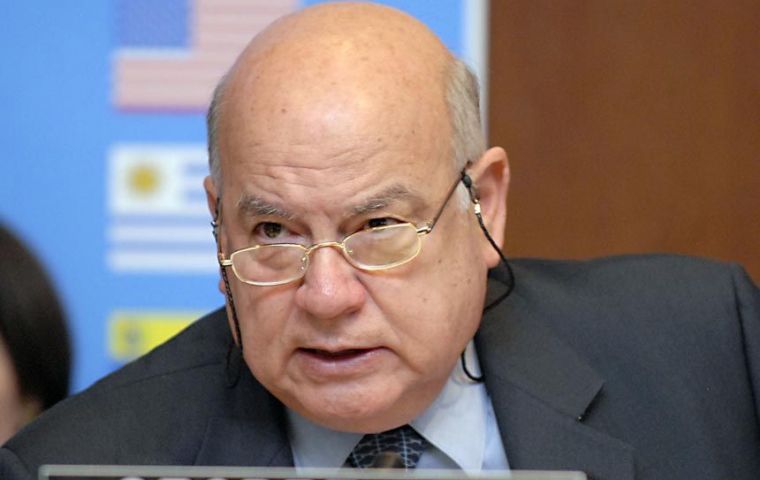MercoPress. South Atlantic News Agency
Insulza re-election as OAS Secretary General is “almost certain”
 Jose Miguel Insulza seems poised for OAS re-election in spite of the Honduras crisis and The Washington Post editorials
Jose Miguel Insulza seems poised for OAS re-election in spite of the Honduras crisis and The Washington Post editorials With less than a week for the election of a new Organization of American States Secretary General, OAS, international analysts consider as “almost certain” the re-election of Chile’s Jose Miguel Insulza, although they do not discard a last minute “artificial” or protest candidate.
The event takes place next Wednesday March 24 in Washington and whoever is elected will have the job for the following five years.
According to Peter Hakim, president of Inter-American Dialogue, a centre of Latinamerican studies in Washington, the former Chilean minister can be considered “almost re-elected”, since “it’s hard to loose an election when you don’t have an opponent”.
Walter Sanchez from the International Studies Institute of the University of Chile agrees with Hakim adding that following the 8.8 magnitude quake which struck Chile February 27, “somehow it changed the poor willingness towards the re-election of Insulza”.
“I had serious doubts about the continuation of the former Chilean minister in the OAS job, but I believe that the post-quake modified that context since Insulza is seen as a coordinator of efforts, in the region to establish a space for political dialogue and the level of criticism towards the current and previous OAS performances has since been contained” added Sanchez, who also admitted that a “last minute” candidate should not be ruled out.
“Maybe there could be a candidate to express some sort of protest, but in terms of a viable or serious candidate, there are none”, underlined Hakim.
“It’s all part of the political game, an artificial candidate to show concern about OAS performance and standing, who might even go as far as question Insulza’s achievements or wants to make a presentation for the following election”, said Sanchez.
So far most South American and Caribbean countries have expressed support for Insulza, others such as Peru said they would prefer some other candidate while the administration of President Barack Obama has remained tight lipped.
“The US can’t be absent from the main institution in the hemisphere. I’m kind of surprised that so far the US had not made it clear or public which are its concerns in the region…it sound something like a lack of interest”, said Hakim.
Sanchez however was more cautious, “in these scenarios sometimes the US support is like the kiss of death: the fact Washington supports creates more doubts and generates resistance”.
But it will be hard not to see the US making public its support before expressing its ballot, “particularly if we take into consideration that there’s a top official of Chilean origin: the Assistant Secretary of State for Hemispheric Affairs, Arturo Valenzuela”.
Regarding the criticisms to Insulza’s OAS performance by The Washington Post (at least two editorials) Hakim said he disagreed with the contents and even sent a letter to the newspaper stating his position on the issue.
“It was a criticism out of context. It said the OAS was a well run institution until Insulza arrived when all begun to go wrong. That is not correct. OAS is an institution of sovereign states which acts based on that sovereignty board, and which can’t advance much without the agreement of all countries; that is the nature of multilateral institutions”, argued the president of the Inter American Dialogue.
However he admitted that Insulza has “committed mistakes” and sometimes has acted with “a certain aggressiveness”, but overall he has made OAS “more active and with greater exposure to the media”
Sanchez said that some of the criticisms against Isulza are “valid” particularly those related to the 2009 Honduras crisis, “undoubtedly at this point there was evidence of a lack of support or insufficient capacity to articulate interests”, plus the “condescendence” towards the Cuban regime of the Castro brothers.
“I think that if Insulza manages to make OAS more pro-active in democratic consolidation, in creating spaces of political coordination in the region, that is the best hopefully that could happen”, concluded the Chilean political scientist Sanchez.




Top Comments
Disclaimer & comment rulesCommenting for this story is now closed.
If you have a Facebook account, become a fan and comment on our Facebook Page!